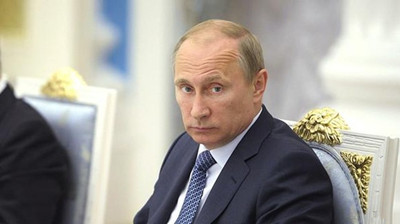俄羅斯和烏克蘭
Putin's Ukrainian U-turn
普京對(duì)烏克蘭問(wèn)題的態(tài)度轉(zhuǎn)變
How to treat signs that Russia at last wants to lower tensions
如何看待俄羅斯最終想要緩和局勢(shì)的跡象
A DEFINING feature in the diplomacy of Russia's president, Vladimir Putin, is to keep everyone guessing—because he can use doubt to magnify his threats, conceal his weaknesses and gain the initiative. That was the effect of his words on May 7th, one of the few public occasions he has spoken formally about the crisis in Ukraine. Mr Putin urged the pro-Russian separatists in the east of the country to postpone the referendums they planned for this weekend. He said that he saw Ukraine's presidential election due on May 25th as a “step in the right direction”, contradicting his own foreign minister, who has repeatedly called it absurd. And he reported that he had ordered Russian troops to pull back from the border.
俄羅斯總統(tǒng)弗拉基米爾·普京的一個(gè)典型外交特征是讓所有人都猜不透。因?yàn)樗梢岳靡苫髞?lái)放大他的威脅、掩飾自己的缺點(diǎn)并獲得主動(dòng)權(quán)。作為他為數(shù)不多的在公共場(chǎng)合正式討論烏克蘭危機(jī)的談話(huà),他在5月7日發(fā)表的言論正是起到了這樣的作用。普京敦促在該國(guó)東部的親俄分裂分子推遲原定于本周末的公投。他表示,他認(rèn)為5月25日的烏克蘭總統(tǒng)大選是“朝著正確方向邁出的一步”,這一說(shuō)法與俄羅斯外交部長(zhǎng)的說(shuō)法相矛盾,該部長(zhǎng)曾多次稱(chēng)之為荒謬的。同時(shí)普京還報(bào)告說(shuō),他已下令俄羅斯軍隊(duì)撤出邊境。

A few welcomed this as the turning-point in a crisis that has now escalated into a low-intensity war. It is to be hoped that they are right. But many more, including this newspaper, will greet Mr Putin's words with due scepticism. Throughout the crisis, Russia has said one thing and done another. Even as the diplomacy takes its course, the West must sustain its pressure on Russia and its support for Ukraine.
一些人樂(lè)觀地認(rèn)為這是這場(chǎng)已然升級(jí)為低強(qiáng)度戰(zhàn)爭(zhēng)的危機(jī)的轉(zhuǎn)折點(diǎn)。希望他們是對(duì)的。但包括本刊在內(nèi)的更多的人抱著懷疑的態(tài)度將會(huì)迎合普京的話(huà)。在這場(chǎng)危機(jī)中,俄羅斯說(shuō)一套做一套。即便是出于外交需要,西方也必須維持其對(duì)俄羅斯施加的壓力和對(duì)烏克蘭的支持。
Bait and bait again
兵不厭詐
The starting point is to gauge whether Mr Putin means what he says. He has promised Russian troop withdrawals before only to fall short: this time the retreat will need to be unambiguous. Actions in Ukraine count, too. Rather than continuing to incite the pro-Russian separatists, Mr Putin must be seen to use his influence to broker peace. But the most revealing test of his sincerity will be Russia's media, which have been doing their bit for the Kremlin by pouring out anti-Ukrainian propaganda. They must now cease their relentless warmongering.
出發(fā)點(diǎn)在于衡量普京能否說(shuō)到做到。他曾承諾在功虧一簣前撤走俄羅斯軍隊(duì),這一次的撤軍需要更加明確。在烏克蘭的行動(dòng)同樣也需如此。與其繼續(xù)煽動(dòng)親俄分裂分子,普京更應(yīng)該利用其影響力去促成和平。俄羅斯媒體最能真實(shí)地考驗(yàn)他的真誠(chéng),他們已經(jīng)通過(guò)宣傳反烏克蘭為克里姆林宮做出了自己的貢獻(xiàn)。現(xiàn)在,他們必須停止無(wú)休止的挑釁行為。
Suppose that the Kremlin passes these tests, what then? Until now, Mr Putin seemed bent on fomenting confrontation in Ukraine—with the threat of Russian invasion kept in reserve. He has two reasons to step back. One is the increasingly burdensome sanctions that are beginning to damage the Russian economy. Possibly even more troubling for him is the mounting death toll in eastern Ukraine. The fighting is taking on a hideous momentum, sapping Mr Putin's ability to use his influence over eastern Ukraine to wreck the government in Kiev. Instead, Russia risks being sucked in to the conflict, in order to honour the guarantees of protection that it has given its supporters. Although the threat of invasion is useful for him, actual occupation would involve huge costs. The sight of Russian and Ukrainian troops slaughtering each other would puncture Mr Putin's popularity at home. Much better to keep Ukraine smouldering than to have it burst into flame.
假設(shè)克里姆林宮通過(guò)這些了這些考驗(yàn),接下來(lái)又會(huì)怎樣呢?直到現(xiàn)在,普京似乎仍更傾向于在烏克蘭煽動(dòng)對(duì)抗,并同俄羅斯入侵的威脅一同準(zhǔn)備。他有兩個(gè)理由撤退。一個(gè)是西方國(guó)家越來(lái)越繁重的制裁已經(jīng)開(kāi)始損壞俄羅斯的經(jīng)濟(jì)。或許更令他不安的是有越來(lái)越多的人在烏克蘭東部喪命。這場(chǎng)戰(zhàn)爭(zhēng)正朝著一個(gè)可怕的方向發(fā)展,削弱了普京利用他在烏克蘭東部的影響力來(lái)破壞基輔政府的能力。相反,為了兌現(xiàn)對(duì)支持者承諾過(guò)的保護(hù),俄羅斯有可能會(huì)卷入到戰(zhàn)爭(zhēng)中。盡管威脅入侵對(duì)他而言十分有效,但實(shí)行起來(lái)卻耗費(fèi)巨大。俄羅斯和烏克蘭軍隊(duì)的相互屠殺將削弱普京在國(guó)內(nèi)的受歡迎度。因此,抑制烏克蘭遠(yuǎn)比消滅它要好得多。
Mr Putin seems to be hoping that a grateful world, desperate to avoid conflict, will agree to what he has sought all along: a federation of Ukraine that blocks it from moving towards the European Union and NATO, as well as the uncontested annexation of Crimea. The world should not oblige. Ukraine will need to give more autonomy to its regions—but not such power that they can veto foreign policy. The West must give Ukraine aid and as much advice as its government will take.
普京似乎希望有一個(gè)感恩的世界,竭力避免沖突,認(rèn)可他尋求已久的:烏克蘭聯(lián)邦妨礙它加入歐盟和北約以及對(duì)克里米亞的吞并。但這并不是一個(gè)感激的世界。烏克蘭需要得到更多自治權(quán),但它并沒(méi)有這樣可以否決外交政策的權(quán)力。因此西方國(guó)家必須給烏克蘭以援助以及盡可能多的建議。
This crisis is far from over. Mr Putin can turn the pressure on Ukraine back up just as easily as he seems to have turned it down. He has not relinquished Crimea, and his treatment of Ukraine has betrayed the nature of his regime (see article). Therefore, the West should maintain today's sanctions — and the threat of more. It should strive to lessen its dependence on Russian energy and face up to the fact that, while Mr Putin is in power, doing business with Russia will be perilous. After all, would you trust the man who started a fire next door merely because he has suddenly offered you a bucket of water?
這場(chǎng)危機(jī)還遠(yuǎn)未結(jié)束。普京可以輕易地將壓力轉(zhuǎn)嫁到烏克蘭身上,就像他似乎已經(jīng)拒絕的那樣。他沒(méi)有放棄克里米亞,他對(duì)待烏克蘭的方式已經(jīng)同他的政權(quán)性質(zhì)相背離(另見(jiàn)文)。因此,西方應(yīng)保留現(xiàn)有的對(duì)俄羅斯的制裁并給以更多的威脅。它應(yīng)該努力減少對(duì)俄羅斯能源的依賴(lài),并認(rèn)清這樣的現(xiàn)實(shí)—在普京掌權(quán)期間,同俄羅斯做生意是危險(xiǎn)的。難道你會(huì)相信僅僅因?yàn)猷従油蝗粷娏艘煌八鸵_(kāi)戰(zhàn)的人么?譯者:嚴(yán)文娟












